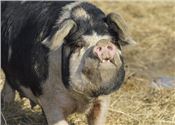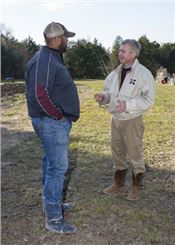|
Pasture-Raised Pork Grows In Popularity In Mississippi
STARKVILLE, MISS.
Specialty markets in pork production are cropping up across the U.S. in response to a growing interest in pasture-raised pigs.
Before the 1960s, most U.S. pork was raised in outside lots or on pasture systems. Commercial pork production today generally relies on large warehouse-like buildings or barns that house sows and pigs in stalls or pens.
As many consumers become more concerned about how their food is produced, outdoor production is becoming popular once again. According to the U.S. Department of Agriculture Economic Research Service, the number of pigs raised in organic livestock operations rose from 1,724 in 2000 to 12,373 in 2011.
Mississippi producers have entered this market to satisfy growing demand. One local producer new to the market is Scott Ross, who attributed the demand for pasture pork to an increasing number of consumers with a vested interest in how their food is produced.
“There are a growing number of people who prefer pasture pork,” said Ross, owner of Palo Alto Farm near West Point. “These consumers want to know how the hogs are raised and harvested.”
Ross said he uses 50 acres of his 250-acre farm to raise pasture pigs. Approximately 20 pigs, including Idaho Pasture, Mangalitsa, and Kunekune breeds, now graze on the property. Ross bought his first pig in May 2014 and said he hopes to have well over 200 by the end of 2015. He plans to raise pigs for breeding stock, as well as specialty markets that include a chain of regional restaurants, local consumers, and high-end grocers and chefs.
“My father raised pigs when I was a little boy, and I’ve always loved them,” Ross said. “My family had this land available with plenty of pasture, so pigs were a natural fit.
“While I know our primary breed will likely be Idaho Pasture pigs, I’d like to experiment with different breeds since we have plenty of space,” he added. “We’ll evaluate growth rate, litter size and other qualities to see what is best suited for our particular target markets.”
Palo Alto Farm is animal-welfare rated, which is required in certain markets, said Vaughn Blaylock, Palo Alto’s farm manager.
“One of the markets we are going after pays better if we are animal-welfare approved,” Blaylock said.
Global Animal Partnership, an international nonprofit organization, awards the designation, which recognizes the welfare practices of producers who are certified by authorized, independent third parties. The program’s aim is to promote continuous improvement, enable retailers to label products as animal-welfare rated and provide insight for consumers into how the animals are raised.
Blaylock said the farm opts for a more natural approach to meet market needs. For example, the farm keeps birds, including chickens and guineas, to help destroy parasites.
“We feed the pigs pumpkins, which serve as natural wormers and keep the stress level down to prevent illness,” Blaylock said. “We provide plenty of feed, attention and reinforcement. The pigs feast on plenty of produce and are not given antibiotics.”
Both men said starting this new venture has been challenging. They take the challenges in stride and strive to find solutions. One challenge involved constructing fencing for the hog pens.
“We tried hog wire, which didn’t work for us,” Blaylock said. “Pigs were able to push through the bottom. We built a trench, but baby pigs were still able to escape.”
They successfully switched to hog panel and are planning to build posts out of cedar found on the property.
“We were able to harvest the cedar from the land and are in the process of building new pens,” Blaylock said. “The fencing will blend well into the landscape, and utilizing resources available onsite helped save cost while reducing the ecological impact.”
Palo Alto has ambitions to become a leader in pasture-pork production in the Southeast. Ross said he wants to find an organic-certified slaughterhouse because he is considering certifying a portion of his operation as organic.
Mark Crenshaw, MSU Extension Service swine specialist, has spent time with Ross and Blaylock as they developed their operation. He emphasized the importance of producers knowing their market before getting started in the business.
“There is a demand for several specialty markets when it comes to pork,” Crenshaw said. “That might be a buyer who only wants to buy a pig that’s been raised outside. Sometimes it is a certain genetic breed, or the pig must be raised without the use of any antibiotics. I caution anyone before they begin production to know their market’s requirements. It’s important to know up front what you’ve got to meet.”
Crenshaw also recommended producers serve more than one specialty market.
“If you are locked into just one market, and for some reason that market doesn’t need pigs when you have pigs ready to go, you don’t have a place to market those animals,” Crenshaw said.
“The most successful producers are strategic,” Crenshaw concluded. “They know their market, they follow a production schedule, and they implement a well-thought-out plan when laying out the pasture. It takes a lot of work and preparation to be successful in the pork industry, and the successful producers are the ones who are prepared.” ∆

Palo Alto Farm near West Point grew this and many other
pasture-raised pigs to meet the increasing demand for locally grown foods.

Scott Ross, right, talks with B.J. McClenton, an agent with the
Mississippi State University Extension Service in Clay County,
about his 50-acre pasture pig operation.
Photos by MSU Ag Communications/Kevin Hudson
|
|